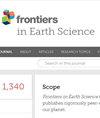利用地理空间建模量化气候变化和城市化对地下水资源的影响
IF 2
3区 地球科学
Q3 GEOSCIENCES, MULTIDISCIPLINARY
引用次数: 0
摘要
城市化对环境的可持续发展构成了重大威胁,尤其是在巴基斯坦,无节制的城市发展和水资源管理不善加剧了水资源短缺和气候多变性。本研究采用随机森林机器学习算法、气候灾害组红外降水和地理加权回归分析等先进技术,考虑了各种参数,包括土地利用/土地覆盖(LULC)、降雨、地表温度(LST)、地下水井和人口数据。我们的研究结果表明,城市化严重影响了北部、西北部和西南部地区的地下水位。研究区域的地下水位(GWL)与年平均 LST 之间存在明显的负相关(-0.333),而 P 值(0.75)也表明 GWL 与 LST 之间存在非常明显的关系。而年 GWL 与平均降水量之间存在正相关(0.666)(p 值为 0.333,中度显著)。这项研究为政策制定者了解城市化和气候变化对地下水的影响以及制定减轻研究地区不利影响的战略提供了重要见解。本文章由计算机程序翻译,如有差异,请以英文原文为准。
Quantifying the impact of climate change and urbanization on groundwater resources using geospatial modeling
Urbanization poses a significant threat to environmental sustainability, particularly in Pakistan, where uncontrolled urban growth and water mismanagement have exacerbated water scarcity and climate variability. This study investigates the spatiotemporal impacts of urbanization and climate change on groundwater in Lahore District, Pakistan. various parameters were considered to execute the study including land use/land cover (LULC), rainfall, Land Surface Temperature (LST), ground wells and population data using advanced techniques such as Random Forest machine learning algorithm, Climate Hazards Group Infrared Precipitation, and geographically weighted regression (GWR) analysis. Our findings reveal that urbanization has severely impacted the water table in the north, northwest, and southwest areas. There is a significant negative negative correlation (−0.333) between the quantity of groundwater level (GWL) and the annual average LST whereas, the p -value (0.75) is also showing highly significant relation of GWL and LST in the study area. Whereas a positive association (0.666) exist (p -value 0.333 moderately significant) between yearly GWL and the mean precipitation. This research provides crucial insights for policymakers to understand the effects of urbanization and climate change on groundwater and develop strategies to mitigate adverse impacts in the study area.
求助全文
通过发布文献求助,成功后即可免费获取论文全文。
去求助
来源期刊

Frontiers in Earth Science
Earth and Planetary Sciences-General Earth and Planetary Sciences
CiteScore
3.50
自引率
10.30%
发文量
2076
审稿时长
12 weeks
期刊介绍:
Frontiers in Earth Science is an open-access journal that aims to bring together and publish on a single platform the best research dedicated to our planet.
This platform hosts the rapidly growing and continuously expanding domains in Earth Science, involving the lithosphere (including the geosciences spectrum), the hydrosphere (including marine geosciences and hydrology, complementing the existing Frontiers journal on Marine Science) and the atmosphere (including meteorology and climatology). As such, Frontiers in Earth Science focuses on the countless processes operating within and among the major spheres constituting our planet. In turn, the understanding of these processes provides the theoretical background to better use the available resources and to face the major environmental challenges (including earthquakes, tsunamis, eruptions, floods, landslides, climate changes, extreme meteorological events): this is where interdependent processes meet, requiring a holistic view to better live on and with our planet.
The journal welcomes outstanding contributions in any domain of Earth Science.
The open-access model developed by Frontiers offers a fast, efficient, timely and dynamic alternative to traditional publication formats. The journal has 20 specialty sections at the first tier, each acting as an independent journal with a full editorial board. The traditional peer-review process is adapted to guarantee fairness and efficiency using a thorough paperless process, with real-time author-reviewer-editor interactions, collaborative reviewer mandates to maximize quality, and reviewer disclosure after article acceptance. While maintaining a rigorous peer-review, this system allows for a process whereby accepted articles are published online on average 90 days after submission.
General Commentary articles as well as Book Reviews in Frontiers in Earth Science are only accepted upon invitation.
 求助内容:
求助内容: 应助结果提醒方式:
应助结果提醒方式:


